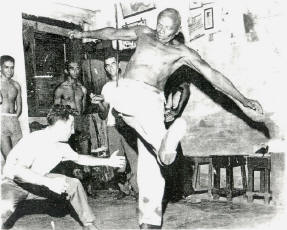I wrote this article for the website of Teaching House New York, where I got my CELTA (Certificate in English Language Teaching to Adults).
I teach in Salvador, capital of the state of Bahia in northeastern Brazil. This tropical city is home to over three million people and has a rich, unique culture. If all you know about Brazil is soccer and carnaval, then take another look! In Bahia you can eat moqueca, a fish and vegetable stew with palm oil; learn forró, a traditional dance from the countryside; and try capoeira, a mix of martial arts and dance.
Ten days after finishing my CELTA in June 2010, I took a leap of faith and flew to Brazil without any contacts or job offers. As soon as I arrived, I Googled the addresses of twenty-five English schools in Salvador, mailed a resume and cover letter to each, and was hired at two. I currently split my time between them for a total of 15 hours per week. It’s a mix of group and individual classes, and students are mostly professionals working at multinational companies. The schools provide coursebooks and a rough syllabus, but thankfully I also have the freedom to modify and supplement the material.
My CELTA training has been invaluable, particularly in making lessons communicative and warming up and wrapping up each activity. If I’d begun teaching without CELTA, I imagine I’d be pulling my hair out and wondering, “Why aren’t my students participating?” The variety of interactive teaching methods I learned in CELTA are especially helpful in livening up classes with beginner/pre-intermediate students and those studying business English, which tends to be a bit dry.
Bahians are warm, passionate people who take having fun very seriously. There’s at least one holiday in every month of the year, and almost everything – from a soccer game to Election Day – is reason for a celebration. My students love to laugh and have a good time in class, which makes both the teaching and learning experience very enjoyable. Plus, sometimes you just can’t help but laugh when a student consistently mispronounces “pie chart” as “pee chart” despite repeated correction!
It’s not for nothing that this region is known as a terra de alegria – the land of happiness. The Bahian optimism and enjoyment of life is infectious, and it’s hard to stay upset or stressed for very long. I’ve learned to be patient, flexible, and keep a positive attitude when dealing with life’s difficulties, both large and small.
Outside the classroom, some highlights of my time in Brazil have been visiting Imbassaí, where you can walk miles on the beach without seeing another soul; and participating in the guerra das espadas, a local custom during the festival of São João in which citizens take to the streets at night and throw homemade rockets at each other. It’s dangerous, but fun – definitely an adrenaline rush!
To enter Brazil, you must have a tourist visa, which is valid for three months with the option to extend it for three more. Wages for English teachers are about $16/hour, which allows you to live as a member of the growing Brazilian middle class. After finishing this teaching semester, I plan to enroll in college classes so that I can continue living in Brazil on a student visa.
Some people comment cynically that “Brazil is the country of the future… and always will be,” meaning the country will never fulfill its potential. Despite the many social and political challenges, Brazil is on a strong wave of economic growth and will host the World Cup in 2014 and the Olympics in 2016. I believe that Brazil does in fact have a bright future – and I love to play a small part in helping my students realize their dreams!

Me with three of my students


